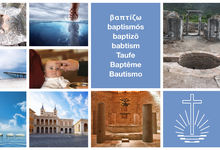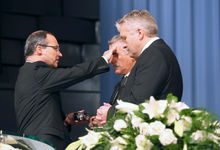The sacraments (66): Here and there in a good dozen articles
Sacraments for the dead, this is a special feature of our New Apostolic faith. This is an aspect in our sacrament series that we could not have done without. In fourteen articles we examined the doctrine, how it is practised, and explored its history. In conclusion, here is an overview.

For God there is no dividing line between this life and life in the hereafter. This is what Christians believe and what the Bible tells us. And the sacraments for the departed that are dispensed in the New Apostolic Church testify of this.
Fundamentals of faith
The basis for this is the belief in the immortality of the soul. This is a notion that is only beginning to unfold in the Bible. Only in the post-New Testament period did Greek and Jewish ideas merge into an early Christian coexistence.
Sacraments for the departed only make sense if human beings can still change in death. Judging by the teachings of their church, the majority of Christians believe in a chance in the afterlife.
As a matter of fact, not only the New Apostolic faith professes that sacraments can also help the dead. This is also taught in the Catholic Church and in Orthodox Christianity. This is shown by a look at the wider picture.
The pillars of the doctrine
There are three pillars in the Bible that support the New Apostolic Church’s understanding of salvation for the departed.
- The underlying question is, what does God want? The Bible has a great deal to say on that subject, namely that all human beings are to be saved.
- This conviction can already be found among the earliest Christians and is confirmed by the biblical motif of Christ’s descent into hell.
- Finally, the Bible documents a practice known as vicarious (or proxy) baptism: Christians in Corinth were baptised on behalf of the unbaptised departed, which was later said to have been forbidden.
In this context, the doctrine follows two basic laws of the Christian faith.
- God created salvation in this world. Jesus Christ Himself set the example by coming into this world to bring salvation to the living and the dead.
- The principle of substitution makes the actions of individuals the point of entry for God’s saving presence in the world.
Putting things in order
Things got off to a turbulent start in the early days of the sacraments for the departed. But step by step,the New Apostolic Church first regulated how it was to be practised and then also clarified the theory. Some equated the practice of providing salvation for the departed with spiritism. But this contradicts the facts. After all, scholarship sees these two as polar opposites in several decisive points.
Three times a year, New Apostolic Christians celebrate a a divine service of remembrance for the dead that is observed in all congregations around the world. Two ministers stand in front of the Apostle who dispenses the sacraments upon them by proxy—in the same way as is done upon the living.
As matter-of-fact as the event may seem, the congregation is emotionally involved. The songs and other pieces of music add to the emotional aspect. The believers experience these divine services as something very special.






















